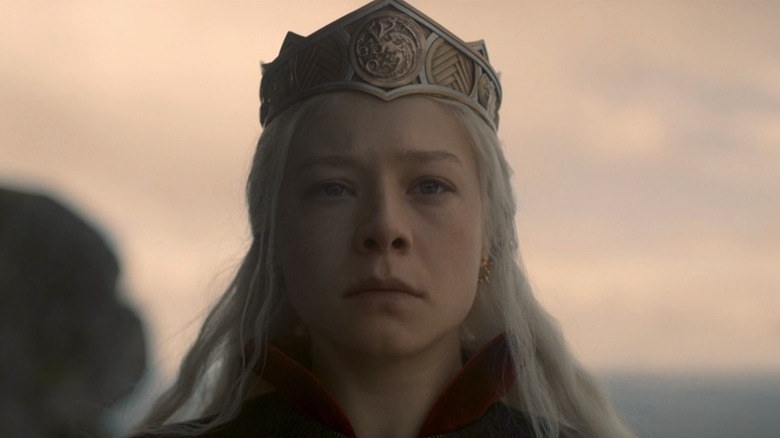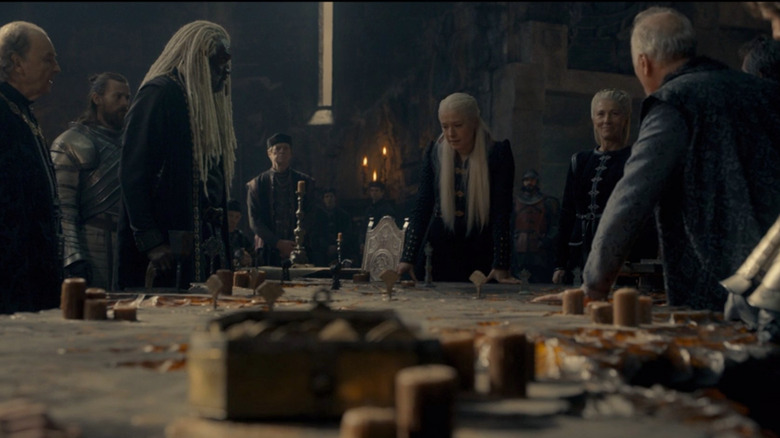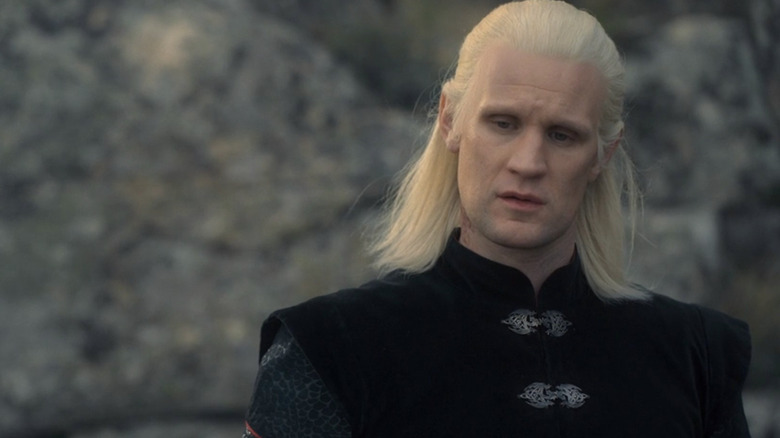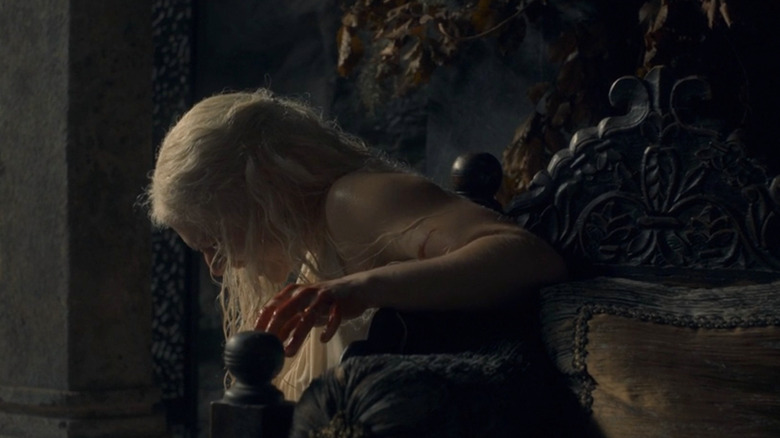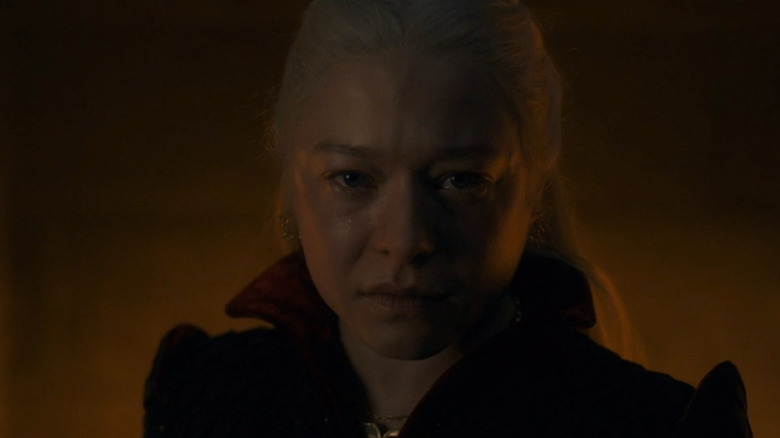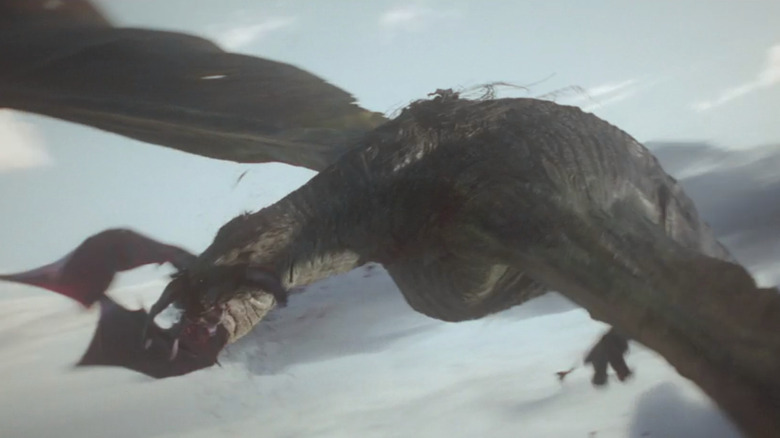House Of The Dragon's Earliest Strengths Still Applied In The Finale
Major spoilers ahead for the "House of the Dragon" finale.
We made it through 10 episodes of the "Game of Thrones" prequel series "House of the Dragon," and it was a wild (dragon) ride. Some of the scenes were hard to watch, including the terrible, horrible birth in the finale. Some were literally hard to watch because they were so freaking dark that you couldn't actually see what was going on. Still, it was a stunning first season.
One of the big complaints about "Game of Thrones" was the sheer number of characters, locations, and history. Many of us, even those who had read the George R.R. Martin books it was based on, had to take notes or look things up to keep it all straight. Early in "House of the Dragon," though, as /Film's own Michael Boyle pointed out, having fewer characters to follow meant that we could connect to them rather than just try to keep them straight. (Fun game: Try to quiz yourself on how many of the characters you remember from "Game of Thrones." I guarantee you'll leave a chunk of them out.)
This time around, it feels like the showrunners really wanted us to understand what was happening rather than just submerge us in the world of Westeros. Let's examine how this made it all better and the few things that didn't work.
The difficulty with prequels
"Game of Thrones" was a cultural watermark that changed the landscape of television. You have a show that sucked people in long before it aired. Book readers were getting newbies all excited by promising a wedding to remember, and the major supernatural elements weren't even introduced until the end of season 1. No character was safe and could die long before you learned anything about them. We followed a few characters closely, but there were so many stories that we couldn't get a firm handle on any one of them. The "previously on" segment became a lifeline, as did recaps.
Most people stayed until the end, but the final seasons were rushed, and one could argue (I am one of them) that character threads and motivations just flew out the window like a baby dragon. Many scenes were dark (some things haven't changed), most of the characters we actually invested in ended up in odd places, and the ending wasn't satisfying at all.
"House of the Dragon" began with those issues hanging over it, as well as the prequel curse. They're very hard to pull off when you know what's going to happen. "The Lord of the Rings: The Rings of Power" at least had thousands of years of time between the events of the series and the ones in the Peter Jackson films. "House of the Dragon" is set less than 200 years before the earlier show. How do you make people care about these characters when we have a pretty good idea of what they're going to do? How do you keep viewers from turning off, knowing that most of these fictional people will be complete jerks?
You need time to create sympathy for the devil
There is the old argument that villains never think they're the bad guy. The best-written villains make you sympathize with their cause. That is what "House of the Dragon" does best, and it's because there are far fewer characters, action scenes, and locations, giving us time to connect with the main players. "Game of Thrones" had shock on its side. We really didn't expect these people to be as awful or brutal as they were, so that was what kept us riveted. So many years later, that shock has faded. In the prequel series, the technique to make us care about these unpleasant people is that we actually spend enough time with them to understand them.
We see years of King Viserys (Paddy Considine) trying to do the right thing. We watch his actions knowing that he's a good person (for the most part), but realizing that his kindness is destroying his kingdom. We get to know how much Rhaenyra (Milly Alcock, and later Emma D'Arcy) and Alicent (Emily Carey, and later Olivia Cooke) love each other before they tear each other apart. We see Daemon (Matt Smith) as a monster, then begin to understand him. We watch him bend and start to care about people, then our hearts break (and maybe we like it a little) as he reverts back. It matters because we got to know him. We got to watch him in his softer moments, making the harder ones more powerful.
Friends and enemies
The same goes for a character like Rhaenyra. Her youthful mistakes are on the screen. We get to watch her with her father for so long that we understand why she doesn't want to start a war. We see her be sort of an ass as a kid, but we also watch her become a loving mother. Knowing how much she cares for her children makes it all so much more impactful when we realize that giving birth in the middle of the outset of a war incapacitates and frustrates her. We know why she makes the turn at the end after the loss of yet another family member.
If we look at Alicent, sure, we could hate her easily. However, we've also had time to watch how she's suffered through forced marriage, jealousy for Rhaenyra's freedom, and the maiming of her own child. We can see why she wants her terrible son to rule but also why she wants peace with her childhood friend. We had time to understand Rhaenys (Eve Best) and the love between her and Corlys (Steve Toussaint), as well as what each of them was willing to do to secure their bloodline in power. That means that when he comes back in the finale, there is an emotional shorthand for understanding why she's angry with him, worried about him, loves him, and that she's willing to fight him if he disagrees with her choices.
We didn't get the chance to get to know so many of the "Game of Thrones" characters. There were so many storylines to follow that, by the time you got back to someone, you had likely forgotten your feelings for them in the first place, or at least some of them.
Grief is sharper than any famous blade
Leaving us less to keep track of (along with our knowledge of the world from the earlier HBO series) allows us to care about these largely flawed and often unpleasant people. Some viewers have complained that there is a lot of talking and moving from room to room, but that's what makes it work. Instead of looking at some existential danger from the North in the early episodes as we did in "Game of Thrones," we understand that it's the people talking in these rooms that are far more dangerous than any White Walker or Night King. (Not that he was really that dangerous in the end.)
Talking can get people killed, and it often happens in a quick burst of violence, not a long, drawn-out battle or journey to one. You say the wrong thing in a council chamber, and you have your head squished on the table. You threaten the balance of power, and someone cuts your head off. It's quick and bloody, and then we're back to character development and the ramifications that act had on everyone.
We get to spend time looking at grief and the danger that comes when powerful people deal with too much of it. The few violent scenes that are drawn out are the birth scenes, and while I had a lot of trouble watching them, it makes sense. That's a personal battle with ramifications instead of a field full of extras hacking at each other.
That said, please stop naming everyone Aegon
It's not that there are no issues with "House of the Dragon." Half the cast has platinum hair, it's full of twins with similar names, and speaking of names ... oh my god, please give the children nicknames! There are several Aegons and lots of names that start with Rhae. Honestly, we should be thanking the late Lucerys (Elliot Grihault) for slashing Aemond's (Leo Ashton, and later Ewan Mitchell) eye, so we know which one he is. He also looks about a decade older than his older brother Aegon (Tom Glynn-Carney), which is weird, but helps.
Still, these are minor quibbles. Plus, when we do get action scenes, as mentioned, they're swift and brutal. We didn't need to spend forever in the sky watching the dragon fight. Like Daemon chopping off Vaemond's (Wil Johnson) head, or Criston Cole (Fabien Frankel) smashing Lord Beesbury's (Bill Paterson) face into an attendance sphere, Vhagar snapping Arrax (and Luke) in half in one bite was shocking and quick, and now we can settle into the aftermath as the new season begins.
Will this relative simplicity take us into the second season of the show? I do hope so. We're obviously going to be adding more characters as each House aligns itself with the Blacks or the Greens. There will likely be more locations, and certainly, war is going to bring more battles to the forefront.
My hope is that the writers remember that people responded this season to the time spent with fewer characters. Battles are great and all, but giving us time to care about everyone or at least form hatreds that compel us to watch will keep us from tuning out.
"House of the Dragon" season 1 is available to watch in its entirety on HBO and HBO Max.
